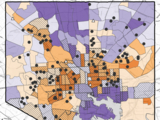Social Science Spotlight
Mapping Juvenile Justice
Social Science Spotlight: Mapping Juvenile Justice
Psychology’s Professor Erika Fountain and GES’s Professor Dillon Mahmoudi recently published research on how minors involved in the juvenile justice system are required to navigate Baltimore City and Baltimore County in order to meet court compliance requirements, and the transportation and support available for them to do so.
A discussion with local attorneys about adolescent clients’ struggle to keep up with expectations of the court inspired the study. Probation requirements often include school, program involvement, meetings, etc, which can span miles across the city or county. Some kids might have as many as 9-10 requirements to keep up with their probation, and if they fall out of compliance, they could face confinement. While the courts aim to keep kids in their communities, it can be difficult to meet all requirements without access to transportation and logistical support.
Drs. Fountain and Mahmoudi decided to map geographically what these requirements look like for kids, and take into account their families, support systems, and access to the city’s transportation network. They seek to define the universe of expectations placed on the involved youth: what are they expected to do each week, what the entire experience looks like from their perspective, and what burdens it places on their families. As part of the mapping project, Fountain and Mahmoudi identified Department of Juvenile Services office locations and homes of the involved youths. Digging deeper, they examined what the home communities face in terms of economics, racial segregation, social marginalization, and access to cars or public transportation, to identify barriers to compliance for the youth.
Through interviews and a focus group, the researchers plan to have participants interact with maps and explain different stages of getting to compliance requirements, identifying social impediments (like bus fare) and spacial impediments (like traveling from Catonsville to Owings Mills for multiple appointments).
Fountain and Mahmoudi are partnering with The Choice Program at UMBC and its youth advisory board (composed of High School students) to think through challenges with transportation and how it impacts compliance for court-involved youth. They plan to begin additional data collection this year, and eventually expand their mapping project to other cities.
Dr. Erika Fountain is a developmental community psychologist with the Department of Psychology, and Dr. Dillon Mahmoudi is an urban and economic geographer with the Department of Geography and Environmental Systems.
Posted: October 12, 2021, 11:57 AM
